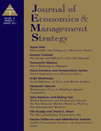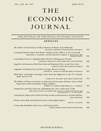
Review of Network Economics
Scope & Guideline
Pioneering research in the dynamics of network economics.
Introduction
Aims and Scopes
- Network Competition and Pricing Strategies:
Research in this area explores how firms compete in networked markets, including pricing strategies, collusion, and bundling effects, particularly in telecommunications and digital platforms. - Regulatory Impact on Market Structures:
The journal examines the effects of various regulatory frameworks on competition and market behavior, including price-cap regulation and yardstick competition. - Consumer Behavior and Market Dynamics:
This scope addresses how consumer choices influence and are influenced by network structures, including studies on online consumer reviews and the implications of mobile technology on employment. - Interoperability and Network Effects:
Research focuses on the importance of interoperability between different network operators and platforms, particularly in mobile money and telecommunications, and how these factors affect market competition. - Welfare Economics in Network Settings:
The journal also considers the welfare implications of network economics, analyzing how exclusivity clauses and other practices impact consumer welfare and market efficiency.
Trending and Emerging
- Digital Platforms and Market Behavior:
Research increasingly emphasizes the role of digital platforms, analyzing their pricing strategies, exclusivity clauses, and the competitive landscape they create, highlighting the growing significance of platforms in the economy. - Impact of Mobile Technology on Economic Outcomes:
Recent studies have focused on how mobile technology influences employment and economic dynamics in emerging markets, showcasing the transformative power of mobile networks. - Net Neutrality and Innovation:
The implications of net neutrality on innovation and market dynamics are gaining attention, reflecting ongoing debates and regulatory considerations in the digital economy. - Sustainability and Welfare in Network Economics:
Emerging research is beginning to explore the sustainability aspects of network economics, considering how network structures impact welfare and social equity, particularly in broadband access. - Interoperability in Financial Networks:
The relevance of interoperability among mobile money agents and network operators is increasingly recognized, as financial technology continues to evolve and integrate into daily economic activities.
Declining or Waning
- Traditional Telecommunications Models:
Research focusing on classical models of telecommunications such as fixed-line networks and their regulation seems to be decreasing as newer technologies and business models emerge. - Consumer Churn Studies:
Although consumer behavior remains a vital area, specific studies on consumer churn in traditional markets, like telecommunications, are less frequent, possibly due to market saturation and the rise of more complex consumer engagement metrics. - E-Commerce in Traditional Retail Spaces:
The focus on the impact of e-commerce on traditional grocery and retail competition has diminished, as the landscape evolves rapidly with new business models and consumer preferences.
Similar Journals

JOURNAL OF REAL ESTATE FINANCE AND ECONOMICS
Pioneering the future of real estate finance and economics.JOURNAL OF REAL ESTATE FINANCE AND ECONOMICS, published by Springer, stands as a vital resource in the field of real estate economics, bringing together innovative research, theoretical frameworks, and empirical studies since its inception in 1988. With an evolving focus that spans various aspects of real estate finance and urban economic dynamics, this journal occupies a prominent position in the academic landscape, reflected in its Q2 ranking in Accounting, Economics and Econometrics, and Finance, alongside a prestigious Q1 status in Urban Studies. Boasting a significant international readership, this journal serves as a key platform for researchers and industry professionals to share groundbreaking findings, thus facilitating knowledge exchange in a rapidly changing economic environment. While the journal currently operates under a subscription model, it remains committed to advancing scholarship with a high impact factor that underscores its relevance and contributions to the ongoing discourse in real estate finance and economics.

B E Journal of Theoretical Economics
Connecting scholars through rigorous theoretical exploration.The B E Journal of Theoretical Economics, published by WALTER DE GRUYTER GMBH, is a prominent academic journal based in Germany, dedicated to advancing research in the field of theoretical economics. With an ISSN of 2194-6124 and an E-ISSN of 1935-1704, this journal has been a valuable resource for scholars since its inception. Recognized for its contributions to the economics domain, it holds a Q3 ranking in the Economics, Econometrics and Finance category as of 2023, positioning it among noteworthy publications within the discipline. Although the journal operates under a traditional publishing model rather than open access, it remains committed to disseminating high-quality theoretical research and fostering scholarly discussions that bridge various economic theories and applications. Researchers, professionals, and students looking to deepen their understanding of economic theory will find a wealth of insights and innovative perspectives within the journal's pages, which have been published with a focus on evolving theoretical frameworks from 2001 to 2003 and again since 2007 through 2024.

Netnomics
Advancing Insights at the Intersection of Technology and EconomicsNetnomics, published by SPRINGER, is a pivotal academic journal focusing on the intersection of economics, computer networks, and information systems. With its ISSN 1385-9587 and E-ISSN 1573-7071, this journal strives to address current trends and research challenges in the digital economy, effectively capturing the dynamics of online markets and digital goods. Although open access options are not available, Netnomics maintains an impressive standing, ranking in the Q3 category for its fields in Computer Networks and Communications, Economics and Econometrics, and Information Systems. Despite its discontinuation of coverage in Scopus from 2005 through 2021, the journal continues to contribute valuable insights, making it a relevant source for researchers, professionals, and students eager to explore the evolving landscape of economic interactions in a digitalized world. With a focus on empirical research and theoretical analysis, Netnomics provides a platform for advancing knowledge at the confluence of technology and economic theory, critical for professionals navigating the complexities of today's economy.

JOURNAL OF ECONOMICS & MANAGEMENT STRATEGY
Driving innovative research for impactful management solutions.JOURNAL OF ECONOMICS & MANAGEMENT STRATEGY, published by Wiley, is a premier academic journal dedicated to advancing research in the interdisciplinary fields of economics, management, and strategic decision-making. Established in 1992 and continuing through 2024, the journal has garnered a reputation for critical analysis and innovative ideas, achieving a prestigious Q1 ranking in Business, Management and Accounting, alongside reputable Q2 rankings in Economics and Econometrics, Management of Technology and Innovation, and Strategy and Management categories. With an ISSN of 1058-6407 and an E-ISSN of 1530-9134, it serves as an essential resource for researchers, professionals, and students keen on exploring the latest trends and empirical studies impacting the fields of management and economic strategy. Although it does not currently offer open access, the journal’s rigorous peer-review process ensures that only high-quality research is published, providing valuable insights that shape real-world practices. Located in the United Kingdom and serving a global audience, this journal plays a vital role in fostering dialogue between academia and industry, highlighting its significance in the ever-evolving landscape of business strategy.

Review of Law & Economics
Empowering Scholars with Open Access to Law and Economics Research.Review of Law & Economics, published by WALTER DE GRUYTER GMBH, serves as a pivotal platform in the intersecting realms of law and economics, with its open access policy initiated in 2016 to promote wider dissemination of research. Based in Germany, this journal aims to foster insightful discussions and innovative research that bridge the gap between legal frameworks and economic principles. With an impact factor reflected in its Q2 rank in Law and Q3 rank in Economics, Econometrics and Finance as per the 2023 category quartiles, it positions itself as a significant contributor to scholarly works in both fields. The journal's unique approach highlights a comprehensive analysis of legal issues through an economic lens, making it invaluable for researchers, professionals, and students alike. As it encompasses a broad spectrum of topics from regulatory analysis to market dynamics, the *Review of Law & Economics* continues to be a vital resource for those seeking to enhance their understanding and application of law in economic contexts, with converged years extending from 2005 to 2024.

JOURNAL OF REGULATORY ECONOMICS
Transforming Economic Understanding of Regulatory PracticesJOURNAL OF REGULATORY ECONOMICS, published by SPRINGER, is a pivotal platform for scholars in the field of economics and econometrics. With an ISSN of 0922-680X and an E-ISSN of 1573-0468, this journal has been a cornerstone since its inception in 1989, showcasing research that bridges regulatory theory and practice. Operating from its base in the Netherlands, the journal is ranked in the Q2 quartile for 2023 in the economics and econometrics category, reflecting its status and impact within the academic community. Although it does not currently offer open access, it remains a key resource for researchers and practitioners interested in regulatory policy implications and economic analysis. With Scopus rankings placing it at #369 out of 716 in the relevant field, the JOURNAL OF REGULATORY ECONOMICS continues to foster significant contributions that shape regulatory frameworks and their economic underpinnings, making it essential reading for anyone involved in the fields of economics, finance, and policy-making.

Journal of European Competition Law & Practice
Illuminating Legal Insights in Competition PracticesJournal of European Competition Law & Practice, published by Oxford University Press, serves as a vital resource in the field of law, specifically focusing on competition law within the European context. With an ISSN of 2041-7764 and an E-ISSN of 2041-7772, this esteemed journal is dedicated to discussing contemporary issues, legal analysis, and policy implications surrounding competition law, and it enjoys a commendable Q2 ranking in the Law category according to Scopus. Researchers and professionals will benefit from its insightful articles, which span a broad spectrum of topics, including antitrust regulation, market dominance, and consumer protection. Although it is not an open-access journal, it provides valuable indexed content, boasting a robust presence in the legal scholarship community, particularly with a Scopus ranking of #449 out of 1025 in the social sciences law category, placing it in the 56th percentile. The journal's commitment to high-quality, peer-reviewed scholarship makes it essential reading for anyone involved in the study or practice of European competition law.

ECONOMIC JOURNAL
Elevating understanding in the dynamic world of economics.ECONOMIC JOURNAL, published by Oxford University Press, stands as a premier academic outlet in the field of economics and econometrics, boasting an impressive Q1 ranking in the 2023 Scopus category. With origins tracing back to 1973, this journal has evolved to become a cornerstone for high-impact research, garnering recognition within the academic community, evidenced by its rank of #113 out of 716 journals in its category, placing it in the 84th percentile. This journal provides a platform for rigorous and innovative scholarship, addressing a wide range of economic issues and methodologies that are crucial for both contemporary research and practical applications. Although it does not offer Open Access options, the ECONOMIC JOURNAL remains an invaluable resource for researchers, professionals, and students seeking to enrich their understanding of economic theory and practice. Its commitment to advancing economic knowledge underscores its importance in shaping future discussions and developments within the field.

QME-Quantitative Marketing and Economics
Transforming Data into Strategic InsightsQME-Quantitative Marketing and Economics is a prestigious academic journal published by Springer, dedicated to advancing the interdisciplinary fields of marketing and economics through rigorous quantitative research. With its ISSN 1570-7156 and E-ISSN 1573-711X, this journal holds a distinguished position as it has been classified in the Q1 quartile in both Economics, Econometrics and Finance (miscellaneous) and Marketing categories for 2023. Operating from the Netherlands, the journal encourages the dissemination of innovative methodologies and empirical findings that address contemporary challenges in these fields, impacting both scholarly discourse and practical applications. Although it currently does not offer open access options, research published in QME is widely acknowledged for its contribution to theory and practice, making significant strides in both academic and industry settings. Researchers, professionals, and students will find this journal a crucial source of insights and a platform for influential discourse in marketing and economic analysis.

Economic Theory Bulletin
Bridging theory and practice for a deeper understanding of economics.Welcome to the Economic Theory Bulletin, a premier journal dedicated to advancing the field of economic theory. Published by SPRINGER HEIDELBERG, this journal serves as a critical platform for researchers and professionals to disseminate innovative ideas and research findings that shape economic discourse. With an ISSN of 2196-1085 and an E-ISSN of 2196-1093, the Economic Theory Bulletin invites contributions that address theoretical advancements and empirical applications in economics, fostering insightful dialogue among scholars. Although the journal operates under a traditional access model, it remains committed to high-quality, peer-reviewed scholarship that meets the rigorous standards of the academic community. The diverse range of articles published here not only contributes to the theoretical foundations of economics but also emphasizes real-world applications, making it an essential resource for students and professionals alike. The journal’s impact on the evolving landscape of economic theory ensures that it remains a vital reference point for the latest research and trends in the field.